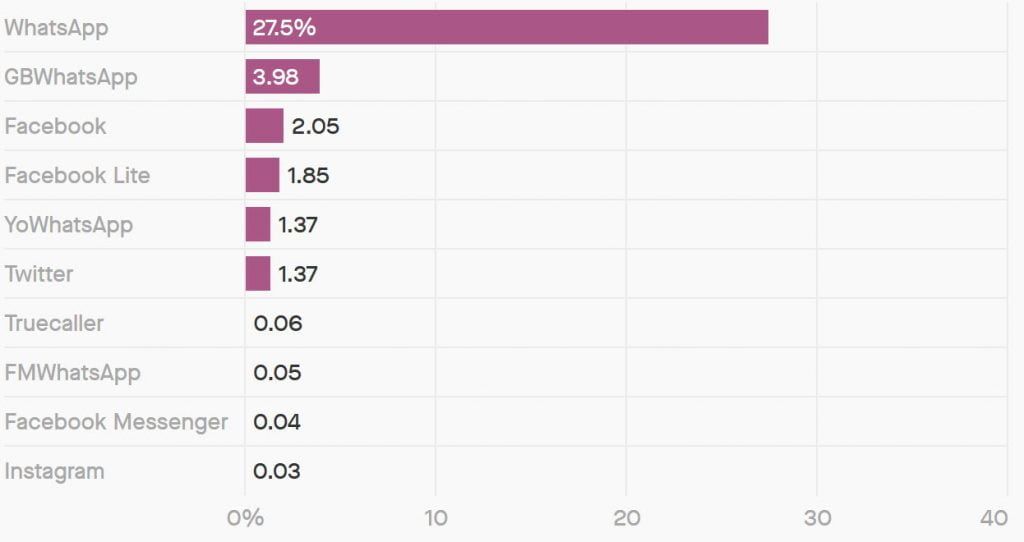If you’ve never used GBWhatsApp (am speaking to iOS users) then you will definitely not relate to why this modded version of WhatsApp is gaining popularity in most African countries — well this and also information based on the latest statistical data. There is no doubt that WhatsApp is, by far, the top social media platform of choice across several African countries, but with the restrictive feature set that comes with Facebook’s app, there is a growing number of users opting for GBWhatsApp or YoWhatsAp alternatives.
It should be noted that modified versions of WhatsApp which are created by third-party developers. These apps are seeing significant usage among African mobile internet users. “WhatsApp mods” like GBWhatsApp, are directly shared from one device to another or downloaded from sources outside official app stores—as such, they don’t show up on download lists of the major app stores.
Failed Ban
Facebook has recently open a battle with these modded versions of its app and was banning users of these apps from the platforms. WhatsApp has always been about trying to be a streamlined app—just trying to be as simple and as secure as possible. But due to its popularity and limited feature set, a developer community cropped up and started making mods of its app. The original GBWhatsApp developers “threw in the towel” and stopped development only the app to be picked up by other developers who continued with it and created the anti-ban version of the app to avoid the Facebook’s ban wrath.
GBWhatsApp draws a lot of people because you can do a lot of things with them that you can’t do with WhatsApp. For example Facebook has just released dark mode on WhatsApp — a feature which was already available on modded versions of WhatsApp. Importantly, users of modified apps can still communicate seamlessly with contacts using official WhatsApp versions.
Statistics don’t lie
According to statistics from Caribou Data, GBWhatsApp is the most widely used WhatsApp mod across major African markets. It allows users operate multiple accounts, restore deleted messages and send and receive larger media files (up to 50 megabytes compared to 16 megabytes on WhatsApp). GBWhatsApp also offers users more control of privacy settings, including hiding features that notify others when users are online, recording a voice-note or typing a message. GB WhatsApp is used even more often than the Facebook app in Africa. Facebook is WhatsApp’s parent company. Caribou Data’s analysis of 230 million distinct app sessions in Nigeria, Kenya, and South Africa—three of Africa’s largest mobile internet markets—showed GBWhatsApp was the second most used social messaging app only behind WhatsApp’s official version a clear indicator that Facebook is losing the battle on such mods.
Below is share of app sessions among users in Nigeria, Kenya, South Africa (2019)

The data gathered was based on anonymously logged smartphone activity tracked by Caribou Data’s research app on users’ phone, with their permission. In total, social media messaging accounted for around 40% of use activity among a vast sample base of 15,000 tracked apps. And three different WhatsApp mod versions were among the ten most used messaging apps: These include; FMWhatsApp, GBWhatsApp and YoWhatsApp.
The downside of using mods like GBWhatsApp
But while WhatsApp mods offer a wider range of extra features, the significant trade-off for users is the loss of WhatsApp’s signature end-to-end encryption on messages. That’s not the only downside either: GBWhatsApp notes the app “is not safe for fair usage” and leaves users at risk of malware infections when downloaded from other sites. Overall, WhatsApp mod developers are usually “candid about warnings” and risks that come with their versions of WhatsApp.
Facebook is clear about these “unofficial” versions of the app, they say they violate its terms of service and are “unsupported” because their security practices cannot be validated. WhatsApp mod users, it also warns, can be banned from using the official app. Yet WhatsApp mod developers advise users not to register with their primary phone numbers in other to circumvent the risk of a ban.

